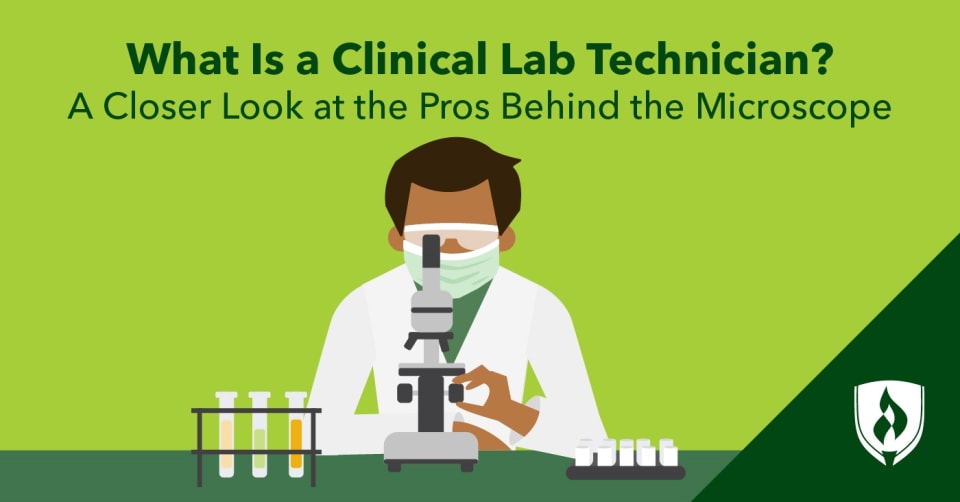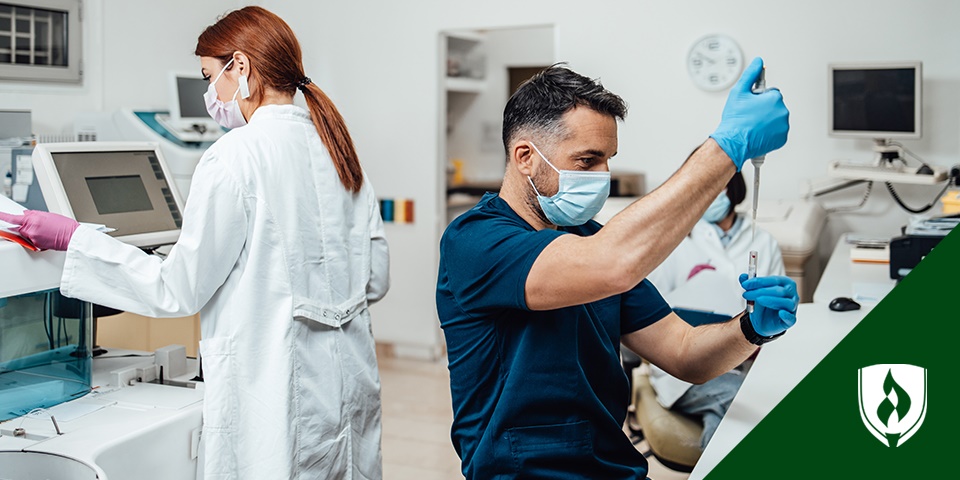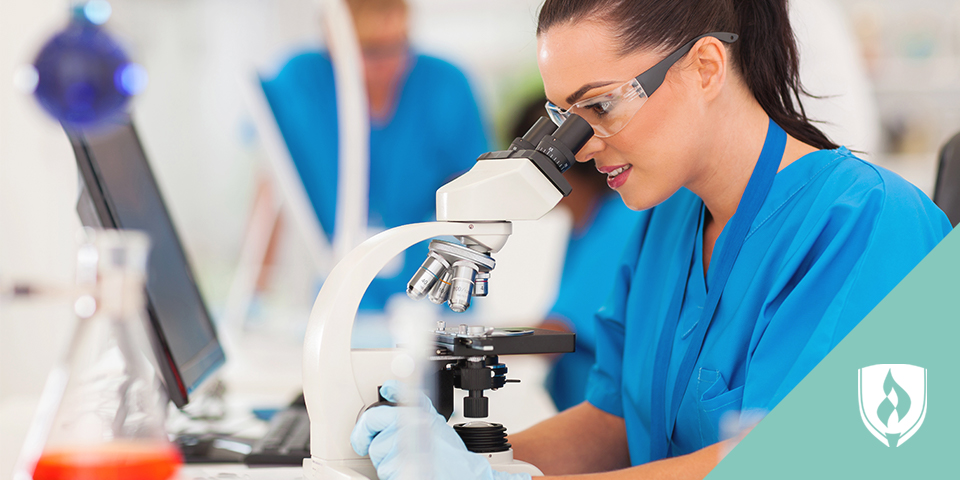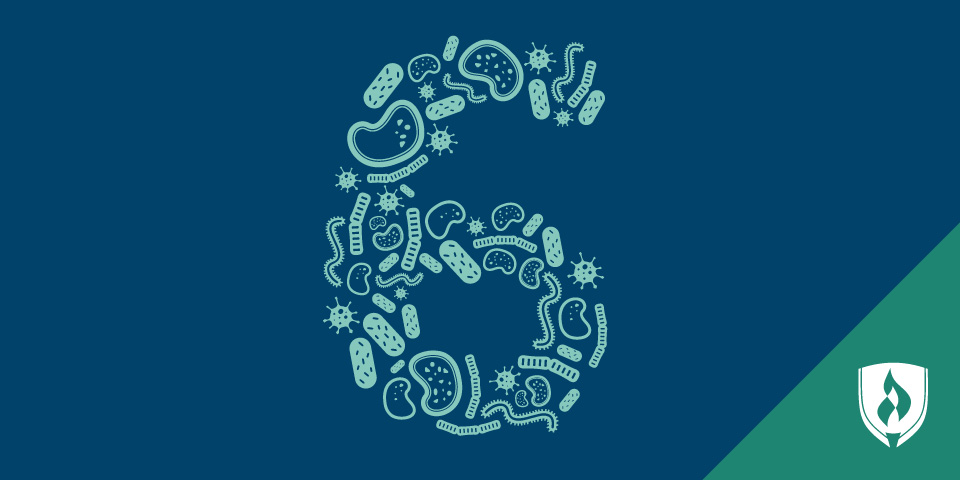What Is a Clinical Lab Technician? A Closer Look at the Pros Behind the Microscope
By Will Erstad on 06/13/2022

When you watch shows like “CSI,” you are always more interested in the forensic side than the criminal side. Even if the portrayals are a little more “made-for-TV” than the real world, you eagerly wait for the lab scenes—when they peer into microscopes and identify DNA clues from the smallest sample. The world of chemistry and microbiology are fascinating, and you want in on it.
If you don’t exactly want to be a big shot scientist but working in a lab appeals to you, a career as a clinical laboratory technician could be right up your alley. If you’re not quite sure what these lab techs do, then you’ve come to the right place. The short answer is that clinical lab technicians work in labs to analyze human samples—from blood to tissue and everything in between. But that’s not the full picture.
We examined this career from all angles to provide you a comprehensive overview of this intriguing healthcare field. So what is a clinical lab technician, exactly? Read on to find your answer to this question and more.
What is a clinical lab technician?
Clinical lab technicians are also commonly known as medical lab technicians, clinical lab assistants, laboratory assistants or simply lab techs. Professionals in this role work in a lab to help study and test different samples—whether it’s blood, tissue, urine or other cellular matter.
This is a great job for those who want to be involved in healthcare but aren’t as comfortable working with patients. There’s no worrying about jumping from patient to patient and keeping up with their needs. As a clinical lab tech, you can concentrate on the task at hand to provide timely and accurate results that help doctors determine diagnoses and treatment plans. You will make a difference through your attention to detail and ability to help identify and report abnormalities and diseases.
Clinical lab technician vs. clinical lab scientist
Before we get too far into it, we should clarify that a lab technician is not the same role as a lab scientist. This distinction isn’t easy to make for a casual observer, particularly in states that do not require licensure to work as a lab technician or lab scientist. Often, the day-to-day work in these roles can look very similar, but there are still a few key differences.
For one, clinical lab scientists (also called medical lab scientists and medical lab technologists) typically have a bachelor’s degree, while lab technicians typically have an associate’s degree. Depending on the lab they work for, lab scientists may also have additional supervisory responsibilities and may be tasked with some of the more complex testing and evaluation work.
What does a clinical lab technician do?
Let’s start with the daily duties of a clinical lab tech. According to the Bureau of Labor Statistics (BLS), clinical lab techs are responsible for many duties including:1
- Performing tests and analyses on human blood, urine, spinal fluid or tissue
- Collecting and reporting data regarding the test results
- Operating sophisticated lab equipment, such as microscopes and cell counters
- Discuss results and findings of lab tests and procedures with physicians
In addition to these common responsibilities, clinical lab technicians may also choose to pursue specialties. Here’s an example of some types of specialists in this field:
- Phlebotomist: collects blood for testing
- Histotechnician: works with tissue samples
- Microbiology technician: studies bacteria and other microscopic organisms
Where do clinical lab technicians work?
It’s clear from the name that these healthcare professionals work in a laboratory environment, but these labs can be found in various settings. The BLS states that nearly half (47%) of all clinical lab technicians are employed in medical and surgical hospitals.1
But there are other facilities that employ these lab techs. Other work environments include: medical and diagnostic labs, physician’s offices, outpatient care centers and colleges and universities. Work schedules will vary depending on the facility, with some requiring overnight, weekend or holiday shifts. Regardless of the setting, lab techs can expect to be on their feet for long periods of time.
What skills do you need to be a clinical lab technician?
An interest in science is certainly important, but that’s not all you will need if you are thinking of becoming a clinical lab technician. We used real-time job analysis software to examine more than 179,000 clinical lab technician job postings from the past year to identify some of the top skills employers are seeking.
Top technical skills:2
- Quality assurance and control
- Phlebotomy
- Chemistry
- Laboratory testing
- Patient care
- Data entry
- Lab equipment and procedures
- Microbiology
- Specimen collection and processing
- Pathology
Top transferable skills:2
- Communication
- Attention to detail
- Organizational skills
- Computer literacy
- Physical abilities
While you should have a proclivity towards science, you will learn the majority of those technical skills through formal education and on-the-job training.
What is the career outlook for clinical lab technicians?
If you’re intrigued by the idea of becoming a clinical lab technician, you’re likely curious about what your job prospects might be. You’ll be happy to hear the BLS projects employment of clinical lab technologists and technicians to grow 11 percent from 2020 through 2030.1 That amounts to adding a projected 36,500 clinical lab technologists and technician jobs during that period.1
Demand for these roles is being driven by several factors. First, healthcare reform has allowed access to affordable medical testing for more patients. Second, with an aging US population comes a spike in patients who need lab work done. Additionally, the BLS states prenatal testing for genetic conditions is increasingly common.1
How do you become a clinical lab technician?
Clinical lab technicians typically need an associate’s degree or post, according to the BLS.1 Some states also require lab techs to be licensed.
Aspiring clinical lab technicians can earn a Medical Laboratory Technician Associate’s degree in as few as 21 months.3 Students can expect to develop their expertise in the following areas:
- Diagnostic testing procedures
- Medical terminology
- Collection and analysis of samples
- How to use lab equipment and technology
- Safety standards
Curious about what courses are included in the clinical lab technician curriculum? Here is a sampling of subjects to expect:
- Clinical Chemistry
- Phlebotomy
- Hematology
- Immunology
- Clinical Microbiology
This program also ensures students get hands-on experience working in a laboratory setting. This pairing of academic knowledge with practical, hands-on skills will provide a job-ready foundation for graduates to launch their medical lab careers.
Launch your lab career
Clinical lab technicians may not be front and center working in healthcare facilities, but their work plays a vital role in determining medical diagnoses. That’s certainly a meaningful (and practical) way to apply a love of science to your career plans.
If you’re interested in working behind the scenes to help support the greater medical team, a career as a clinical lab technician may be the perfect fit. Find out if you have the natural qualities to succeed in this position by reading our article, “6 Signs a Medical Lab Tech Career Is Right for You.”
Related Articles:
1 Bureau of Labor Statistics, U.S. Department of Labor, Occupational Outlook Handbook, [accessed May 2022]. Information represents national, averaged data for the occupations listed and include workers at all levels of education and experience. Employment conditions in your area may vary.
2Burning-Glass.com (Analysis of 179,185 clinical and medical lab technician job postings, May 1st, 2021 – Apr. 30, 2022).
3Time to completion is dependent on accepted transfer credits and courses completed each quarter.
EDITOR’S NOTE: This article was originally published in 2017. It has since been updated to include information relevant to 2022.




